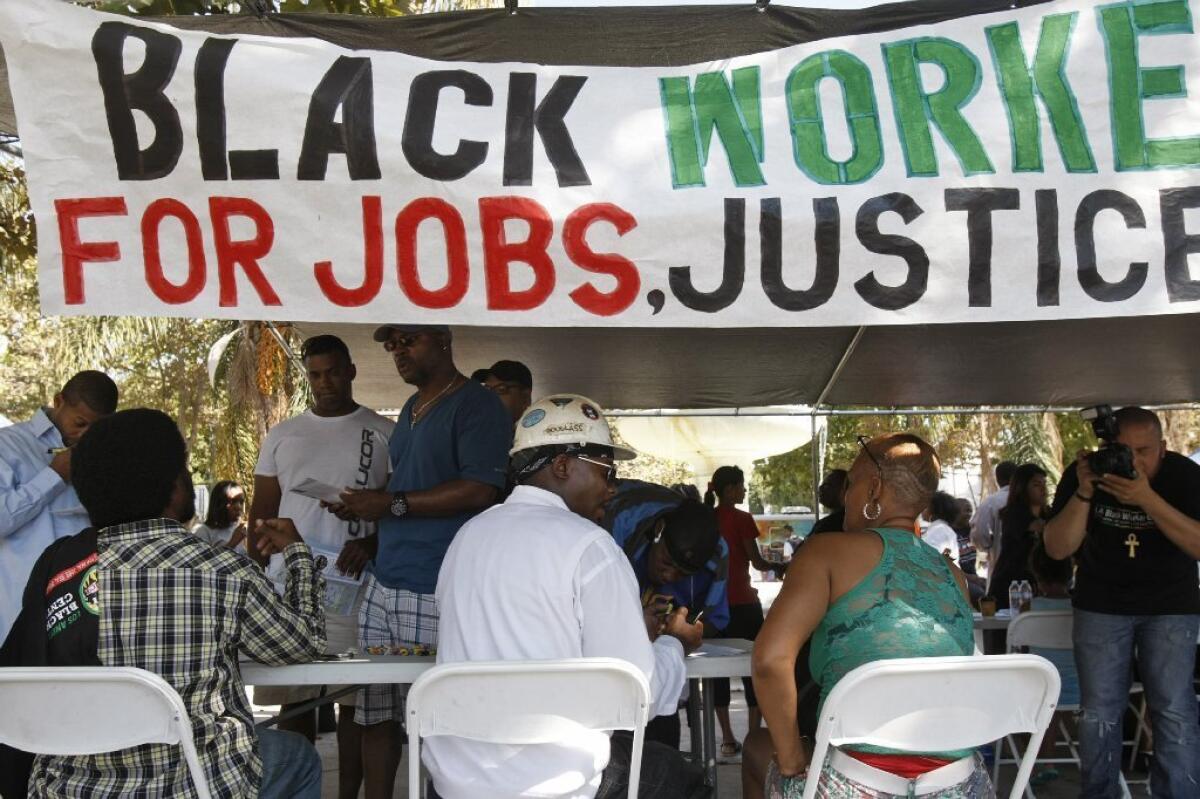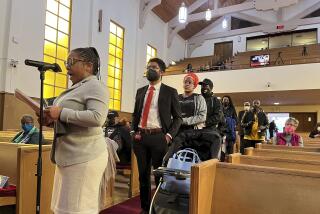When money’s tight, humans define ‘people like me’ as more deserving

- Share via
In the recession from which the United States is recovering, unemployment among blacks and Latinos has been deeper and more entrenched; incomes in black and Latino communities have fallen more sharply; and recovery has been slower and far less complete.
Labor economists cite a host of structural and institutional reasons for these racial and ethnic disparities - that African Americans, for instance, are more likely to be employed in hard-hit public sector or manufacturing jobs than in business or knowledge-based industries. But new findings from a psychology lab suggest another powerful contributor: in circumstances of scarcity, whites see blacks as blacker and are more likely to identify those of ambiguous or mixed race as black. And given the opportunity to divvy up scarce resources, whites are stingier with those of color than they are to those they identify as white.
The stark findings were published Monday in the Proceedings of the National Academies of Science, or PNAS. They’re in line with a growing body of research that suggests that, even in the best of times, humans default to defining “people like me” as more deserving than people who are “other.” And that when resources constrict, that tendency is amplified.
But in the wake of a recession that hit African American and minority workers with particular ferocity, the findings highlight a stubborn but very real fact about the distribution of wealth and hardship in an economy with winners and losers: that an economy’s “structural” features are upheld by humans, and that when those humans feel threatened, their unconscious prejudices can make existing inequality even more glaring.
Psychologists from New York University discerned these patterns in a series of sequential experiments. Each of the four experiments built on the preceding ones, and each used a different sets of subjects - all of whom self-identified as white.
In the first experiment, the authors of the study established that people who tended to see African Americans’ gains as coming at the expense of whites’ were quick to identify faces with any African features as “black.” Subjects were shown sets of facial images that progressively morphed from a Caucasian’s face to that of a same-age African American, and asked to identify whether the individual pictured was “more white” or “more black.” Subjects who indicated (in answers to a preliminary survey) that they saw blacks’ and whites’ economic interests as competing defined the individual as “black” earlier in the progression than did people who saw no conflict between whites’ and blacks’ economic advancement.
A second study showed that when white people are primed to think about scarcity, they are also quicker to judge a face with progressively more African features as “black.” In this case, subjects were again shown images of a face that morphs, by small increments, from sterotypically Caucasian to stereotypically African, and asked to identify which were the faces of a black person. Before viewing each set of facial images, subjects were primed to think about scarcity (by the split-second projection of such words as “scare,” “sparse” or limited”), or were shown words with negative (“brutal”) or emotionally neutral (“fluffy”) words.
Whether subjects saw a negative or neutral word, the point at which they identified a facial image as that of a black person was about the same. By comparison, those primed to think about scarce or limited resources were much more likely to see someone with few African facial features as black.
In a third study, the researcher recruited the help of a group of subjects recruited online to create a “black” face from more ambiguously mixed-race facial images. They did so under two conditions: one in which they believed they were competing to disburse a small pot of money (the scarcity condition); the other, in which they were told they would be disbursing the whole of a small pot of money (the non-scarcity condition).
Finally, the researchers hit the streets with the resulting two facial images: One had been identified as black under scarcity conditions and was deemed by the group the more stereotypically black of the two. The other - the control picture - was identified as black under non-scarcity conditions and was deemed by subjects a more ambiguously mixed-race person.
In a popular New York City park, the researchers enlisted 59 white volunteers to look at the two pictures and decide how they would divvy up $15 - in whole dollars - between them. Forced to disburse the sum unevenly, the white subjects (with an average age of 23) consistently shorted the “black under scarcity conditions” image with $7 or less, and awarded the control picture - the ambiguously mixed-race person - $8 or more.
Overriding our deeply-ingrained impulse to favor “our own” over “others” takes an act of will, and some mental energy, write the authors, New York University doctoral student Amy R. Krosch and psychology and neural science professor David M. Amodio. And pondering the prospect of fighting to keep one’s job, or to put food on the table, is a drain on those mental resources as well.
Perhaps, when opportunities are scarce and money is tight, so too is the competition for our brainpower, they added. And in the ensuing tussle, our laudable efforts to rise above prejudice are swept away by baser impulses.
“Our main finding - that scarcity alters the visual perception of African Americans in a way that promotes disparities - issues a new challenge to efforts aimed at reducing discrimination,” the authors write. Bias operates beneath most people’s level of awareness, so it’s hard to detect and even harder to regulate. As a result, efforts to level the playing field - and to make those policies stick even when the economic going gets tough - will have to work around our natural tendencies to discriminate, they added.
And if our perceptions of a person’s race are so malleable we can declare someone “blacker” just because we feel financially insecure, they added, surely there’s hope that we can reverse the tendency by some other psychological manipulation. Since economic downturns appear to be a regular occurrence, we’d better figure it out.
Fascinated by human behavior? Follow me @LATmelissahealy







